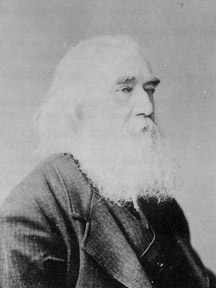Lysander Spooner
Anarchiste individualiste (1808-1887) américain.
Contributions principales à la pensée anarchiste
- Les constitutions sont sans aurorité
- Les hommes de l'Etat sont une bande de brigands
- Le vote ne justifie rien
Controverse : Spooner anarcho-capitaliste ?
Spooner est un anarchiste classique, un anarchiste individualiste, pas un anarcho-capitaliste au sens strict, mais les sujets sur lesquels il a le plus écrits sont des thèmes de théorie anarchiste générale, sur laquelle des anarchismes différents sont d'accord.
Selon Anarchopedia (fra) [1],
- À tort a-t-on récemment fait de Spooner un penseur anarcho-capitaliste. À plusieurs reprises, il critique le grand capital financier qui finance l'État pour s'assurer de de pouvoir exploiter impunément le peuple. Selon Spooner, les États parviennent à livrer des guerres et à organiser la répression de la contestation populaire grâce aux banques et aux grands capitalistes. De plus, Spooner critique sévèrement le salariat.
Il convient de rectifier la première critique : ce que Spooner dit là n'est pas contraire à l'anarcho-capitalisme ! Par exemple, il n'y a pas grand chose à redire du point de vue anarcho-capitaliste à ce passage-là :
- [...] men who never think of lending a shilling to their next-door neighbors, for purposes of honest industry, unless upon the most ample security, and at the highest rate of interest --- stand ready, at all times, to lend money in unlimited amounts to those robbers and murderers, who call themselves governments, to be expended in shooting down those who do not submit quietly to being robbed and enslaved.
- They lend their money in this manner, knowing that it is to be expended in murdering their fellow men, for simply seeking their liberty and their rights; knowing also that neither the interest nor the principal will ever be paid, except as it will be extorted under terror of the repetition of such murders as those for which the money lent is to be expended. [...]
- And why are these men so ready to lend money for murdering their fellow men? Soley for this reason, viz., that such loans are considered better investments than loans for purposes of honest industry. They pay higher rates of interest; and it is less trouble to look after them. This is the whole matter.
Qui par ailleurs éclaire à merveille les débats actuels sur "l'annulation de la dette" : seuls ceux qui ont contracté une dette en sont responsables, que ce soient des politiciens élus ou des dictateurs, Européens ou Africains. Ce n'est pas "le peuple", ou "les peuples", ou "les individus" qui ont emprunté cet argent, ce n'est pas à eux de le rembourser. Il ne faut pas confondre "le capitalisme" qui est pris par les anarcho-capitalistes dans le sens de "libéralisme" et "les capitalistes" dans le sens marxiste, qui ne se préoccupe pas de savoir si ils ont acquis leur capital par "l'exploitation des travailleurs" (condamnée par les marxistes et les anarcho-communistes, mais non par les anarcho-capitalistes, voir leur théorie des classes) ou par la collaboration avec l'Etat (condamnée par tous les anarchistes).
Anarchopedia(eng) [2] , par contre, présente des citations montrant qu'il soutenait la valeur-travail.
Œuvres
- The Deist's Immortality, and An Essay On Man's Acountability For His Belief (1834)
- To the Members of the Legislature of Massachusetts (1835)
- Constitutional Law, Relative to Credit, Currency, and Banking (1843)
- The Unconstitutionality of the Laws of Congress, Prohibiting Private Mails (1844)
- The Unconstitutionality of Slavery (1845, 1860)
- Poverty: Its Illegal Causes, and Legal Cure. Part I (1846)
- Who caused the Reduction of Postage? Ought He To Be Paid? (1850)
- Illegality of the Trial of John W. Webster (1850)
- An Essay on the Trial by Jury (1852)
- A Defence for Fugitive Slaves, Against the Acts of Congress of February 12, 1793, & September 18, 1850 (1850)
- A Plan for The Abolition of Slavery (and) To The Non-Slaveholders of the South (1858).
- Address of the Free Constitutionalists to the People of the United States (1860)
- A New System of Paper Currency (1861)
- Our Mechanical Industry, As Affected By Our Present Currency System: An Argument for the Author's New System of Paper Currency (1862)
- Articles of Association of the Spooner Copyright Company for Massachusetts (1863)
- Letter To Charles Sumner (1864)
- No Treason. No. I (1867)
- No Treason. No. II, The Constitution (1867)
- No Treason. No. VI, The Constitution of No Authority (1870)
- Considerations for Bankers, and Holders of United States Bonds (1864)
- Vices Are Not Crimes: A vindication of Moral Liberty (1875)
- Our Financiers: Their Ignorance, Usurpations, and Frauds (1877)
- The Law of Prices: A Demonstration of The Necessity for an Indefinite Increase of Money (1877)
- Gold and Silver as Standards of Value: The Flagrant Cheat in Regard to Them (1878)
- Universal Wealth Shown to be Easily Attainable. Part First (1879)
- Revolution: The Only Remedy for the Oppresed Classes of Ireland, England, and Other Parts of the British Empire. No. 1 (1880)
- Natural Law; or The Science of Justice: A Treatise on Natural Law, Natural Justice, Natural Rights, Natural Liberty, and Natural Society; Showing That All Legislation Whatsoever Is An Absurdity, A Usurpation, and A Crime. Part First (1882)
- A Letter to Thomas F. Bayard: Challenging His Right - And that of All the Other So-Called Senators and Representative in Congress - To Exercise Any Legislative Power Whatever Over the People of the United States (1882)
- A Letter to Scientists and Inventors, on the Science of Justice, and Their Right of Perpetual Property in Their Disclosures and Inventions (1884)
- A Letter to Grover Cleveland, on His False Inaugural Addrewss, The Usurpations and Crimes of Lawmakers and Judges, and the Consequent Poverty, Ignorance, and Servitude of the People (1886)

